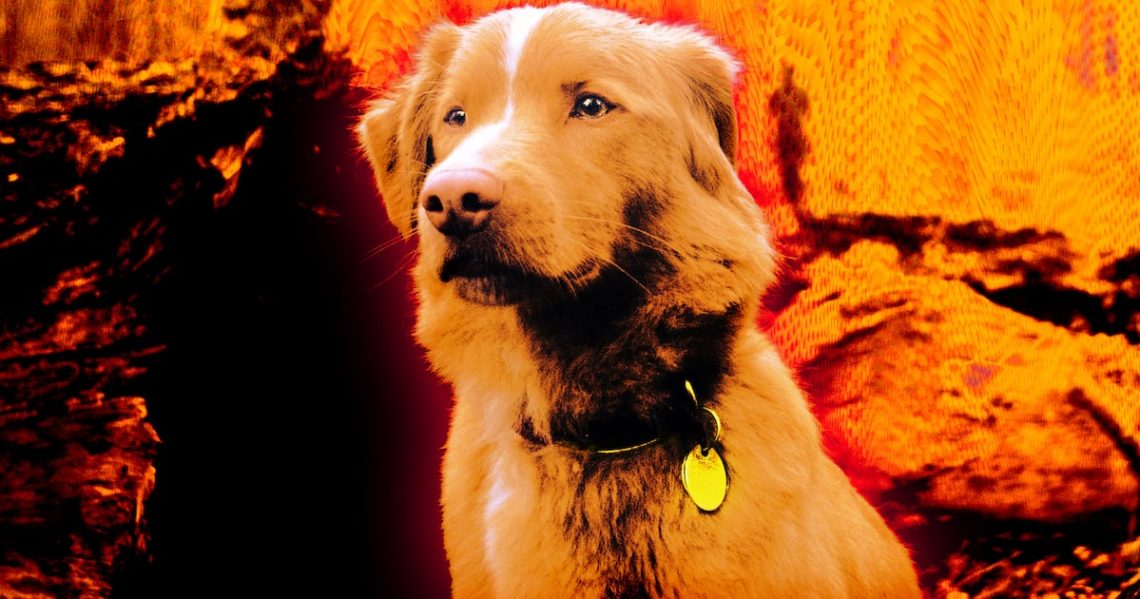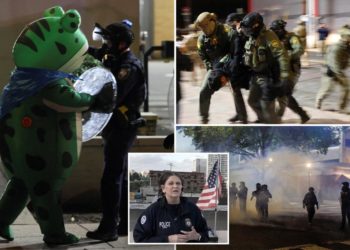Movie stardom is wasted on the canine. Less than a minute into our scheduled Zoom call, Indy, the plucky, furry lead of the demonic possession horror film Good Boy, has lost interest in the occasion and wandered off screen, leaving director Ben Leonberg and producer Kari Fischer to shoulder the press tour’s burdens. But we’re professionals here, so: we ball.
Indy is Leonberg and Fischer’s dog, though dog owners know that relationship tends to operate based on the reverse dynamic: they’re actually his humans.
Filming Good Boy, it turns out, proved much the same; Leonberg and Fischer weren’t making a movie with Indy as much as Indy was making a movie with them, though this again was lost on him. “Indy has no idea he’s in a movie,” Leonberg says. “He doesn’t know the context of the scene.” Animals are notoriously difficult to work with on a film set. Just ask Tom Hanks.
It’s not their fault, though. They’re living their lives. We humans just happen to live ours around theirs. In Indy’s case, that meant going about his daily dog routine as Leonberg, Fischer, and their lead, Shane Jensen, tried to tell a story about a man succumbing to both terminal illness and demonic possession.
Jensen plays Todd, who decamps from his city digs to the disused backwoods cabin formerly occupied by his late grandfather (played by indie horror legend Larry Fessenden). He suffers from an unnamed medical condition, and is also unknowingly tormented by a similarly anonymous sinister entity, which seems to be tethered to his grandfather’s shack. Two individuals care about Todd and his health: sister, Vera (Arielle Freedman, in voice only), who begs him not to leave, on account of how their grandpa died; and Indy, his Nova Scotia retriever.
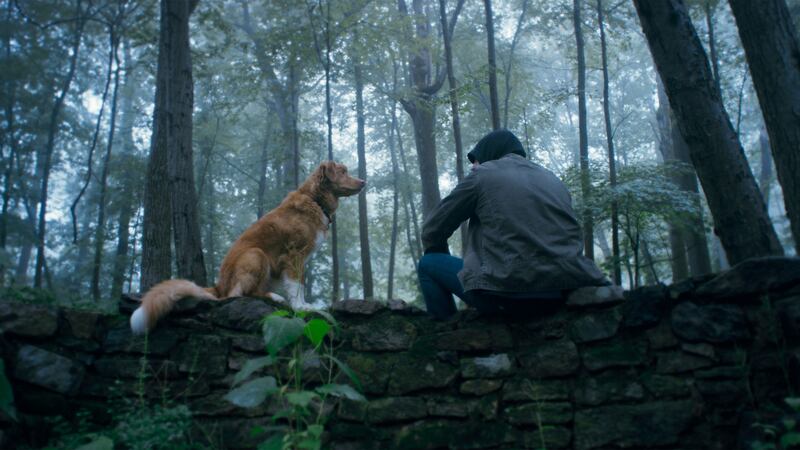
Vera is concerned for Todd, but Indy’s on alert; his radar picks up paranormal activity the moment that Todd pulls into the cabin’s driveway. The rest of Good Boy indulges Indy’s sensitivity to the spirit world. Where the characters in other demonic possession films would overlook signs of peril, Indy observes shadow figures lurking in the corner, lingering by windows, or stalking through their wooded surroundings.
The plot’s horror is couched in communication barriers. Indy knows something’s off, but he doesn’t have the faculty needed to warn Todd away from impending danger. For that matter he lacks the means to defend himself. Besides: Indy is loyal to Todd. Whatever the threat and no matter the harm, he is man’s best friend.
Good Boy mines burgeoning fear out of that dynamic, and from the film’s vantage point. Indy is the audience POV character. In what feels like a minor miracle of independent filmmaking, we experience this crumbling, haunted world entirely through his eyes, an intentional and fundamental choice Leonberg and Fischer made at the outset.
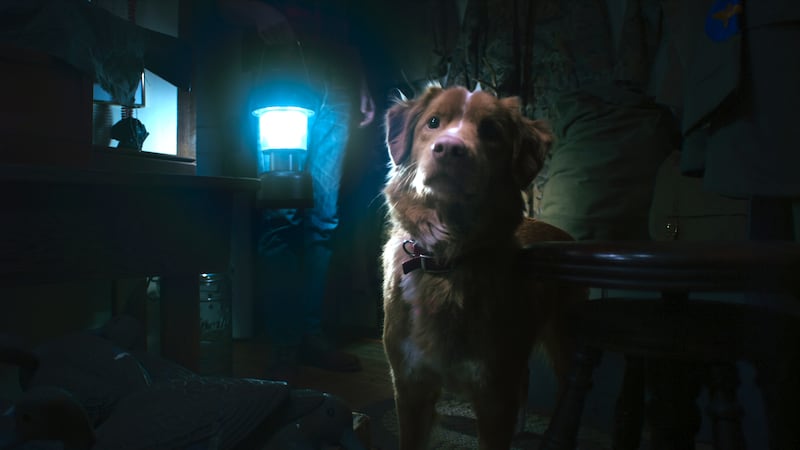
“We built the entire production around him and figured out a way to make movies in order to get a good performance out of him,” Leonberg explains. “Even the way shots are constructed, and the way they’re edited with shots that Indy’s not in, is usually because of something Indy did or didn’t do.” The footage ends when Indy says so: by rolling over on the floor, by scratching his ear, by refusing to move when it would be helpful for him to do so.
Leonberg and Fischer, of course, knew what they were getting into by hiring their dog as their lead. If Indy is the “it” factor drumming up Good Boy’s buzz, from its premiere at this year’s edition of the South by Southwest festival to its theatrical release, the key to the film is technique. “We had to be adaptable every single day that we were making this and just have patience and flexibility,” Fischer says, “and to know that even if we didn’t get something that day, either we’d figure it out or (Ben) would do a rewrite adjustment with (co-writer Alex Cannon), to do horror improv and figure out what would work.”
Shooting with a wide angle lens allayed the challenge. Good Boy makes great use of its setting, capturing vast dead space in the cabin with Indy in the frame. The composition provokes the viewer’s orientation response; one’s eyes dart around the screen, looking out for whatever it is Indy sees that Todd can’t. The effect is mounting dread. On the other hand, working with Indy often meant investing the time setting up a shot only for him to not cooperate when the cameras rolled, because dogs are uniquely vulnerable to exterior distractions and also frankly have better things to do with their time than act in the movies, like chase squirrels, break into the pantry, or nap.
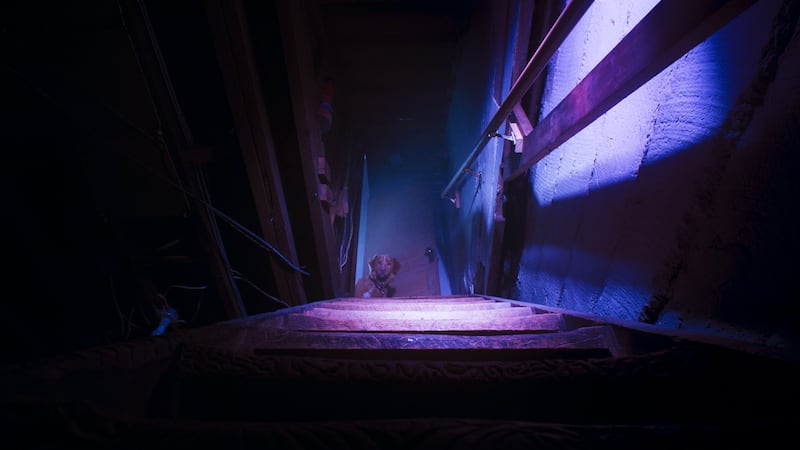
Frustrating as that sounds on paper, there’s a positive trade-off.
“Occasionally (Indy) would do something we could not have predicted that was so much better than anything you could have ever trained a dog to do,” Leonberg says. “Those are some of our favorite parts of the movie.”
A shake of the ear here, a flare of the nose there–small details that help coax the viewer into buying that what they’re watching is performance rather than just animal behavior.
“There’s not really a parallel to what a human actor does, because so much of (Indy’s) performance comes from the shot construction using a combination of his subjectivity and objectivity to convey meaning,” he adds. “The filmmaking leads the audience to believe he feels a certain thing, that he feels a certain way, because the film is leading them to feel that way.”
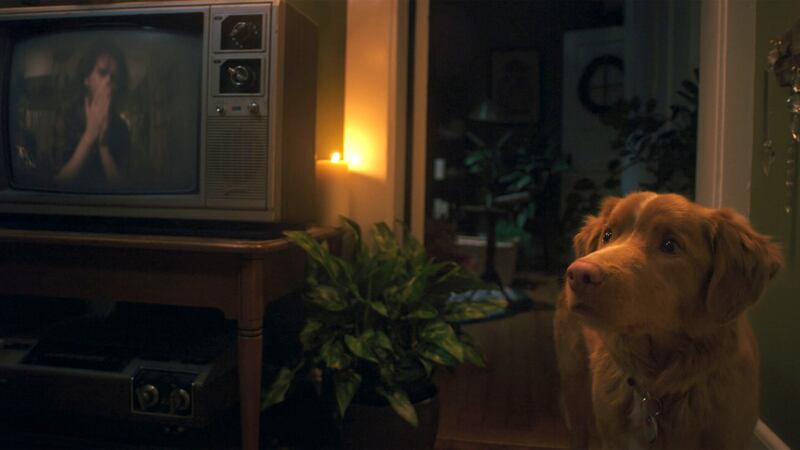
Good Boy has minimal precedent in horror cinema’s animal canon: Cody, the Alaskan Malamute who plays Nanook in Joel Schumacher’s The Lost Boys; the 14 cats handled by animal trainer Karl Miller on Cat’s Eye, Lewis Teague’s 1985 horror anthology film adapted from Stephen King’s work, where a cat named General saves young Drew Barrymore from a soul-sucking troll; and Jed, another Malamute, better known as the sled dog in John Carpenter’s The Thing.
Leonberg acknowledges the presence of King in Good Boy, in terms of atmosphere and tone, but cites Jed as the “gold standard” of great dog acting: “Through (Jed’s) really intense unblinking stare and using the Kuleshov effect, Carpenter creates a compelling performance from a dog.”
Like Indy, Jed was blissfully unaware he was in a movie at all. Nonetheless, his presence’s impact echoes both in the film and popular consciousness. Jed deserves his laurels. So does Cody, and now Indy, too. But they deserve something more: their humans’ unconditional love.
“Something my co-writer said once that makes a lot of sense to me is that we treat our pets and our dogs the way we wish people would treat us,” Leonberg says. Good Boy dramatizes the wish’s antithesis: as Todd’s prognosis worsens under the entity’s influence, he isolates Indy, pushing away the only being able to safeguard him.
The neglect layers tragedy underneath the movie’s thrumming terror. “Dogs are so uncomplicated in their love for us,” Leonberg points out. For as sad as Good Boy’s plot becomes, that truism never falters. Dogs are a miracle. It’s often said, and memed about, that we don’t deserve them. But dogs disagree; we do deserve them, and they deserve us, even when our demons, figurative and literal, drag us into the mud.
The post Meet Indy the Dog, the Star of the New Horror Film ‘Good Boy’ appeared first on The Daily Beast.
